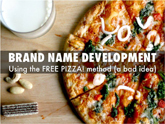Love Is All You Need
With apologies to The Beatles for borrowing a lyric from their song “All You Need Is Love” from The Magical Mystery Tour album, branding that uses “Love” or its symbols are scientifically proven to give persuasion a boost.
Southwest Airlines has understood the power of love for quite a while (e.g., their stock exchange ticker symbol is LUV), and they recently launched a new advertising campaign that utilizes love in verbal and visual form to drive the “Southwest = Love” point home. Suburu is another company that leverages the power of Love in their marketing, including the tagline of “Love. It’s What Makes a Suburu, a Suburu.” What do they know that other brands don’t?
The scientific evidence about the persuasive power of Love abounds. French behavioral psychologists Jacques Fischer-Lokou, Lubomir Lamy, and Nicolas Guéguen conducted a study of pedestrians walking alone on a shopping street1. During the survey the pedestrians were asked to remember either a meaningful episode of love or a meaningful piece of music in their lives. After they had completed the survey and had walked on for a few minutes, the pedestrians were approached by a person holding a map and asking for directions. Those individuals who had previously been cued to think about the concept of love were significantly more helpful in the amount of time they were willing to spend in the effort of helping another person.
In another study, Guéguen and Lamay demonstrated that merely including the concept of love on charitable appeals led to a significant increase in donations2. Adding the words “DONATING = HELPING” to charity collection boxes increased donations by 14% compared to boxes that just contained the usual information about the appeal. However, adding the words “DONATING = LOVING” increased donations by 90%.
Sometimes all you need is a visual symbol of love to make a difference. Southwest Airlines knows this as the “heart” symbol is omnipresent in their marketing materials. Guéguen conducted a study3 where food servers placed the bill, which had been folded in half and placed under a plate, on the table. The server put two candies on top of the plate and left the area. The researchers observed the tipping behavior of the diners. There were three different types of plates used in this study: round, square, and cardioid (heart-shaped). The diners whose bills arrived under a heart-shaped plate left tips that were 17% higher than those whose checks came under a round plate, and 15% higher than those whose checks came under a square plate.
The conclusion from these studies is when people are exposed to words or signs that are synonymous with love it serves as a cue for the person to respond with behaviors that are associated with love. “Love begets love” is more than just an idiom. It is scientifically proven to be a universal truth that can be leveraged in branding and marketing.
1 Fischer-Lokou, J., Lamy, L., & Guéguen, N. (2009). Induced cognitions of love and helpfulness to lost persons. Social Behavior and Personality 37, 1213 – 1220.
2 Guéguen, N. & Lamy, L. (2011). The effect of the word “love” on compliance to a request for humanitarian aid: An evaluation in a field setting. Social Influence 6(4), 249-58, doi:10.1080/15534510.2011.627771.
3 Guéguen, N. (2013). Helping with all your heart: The effect of cardioid dishes on tipping behavior. Journal of Applied Social Psychology 43(8), 1745-9, doi:10.1111/jasp.12109.



